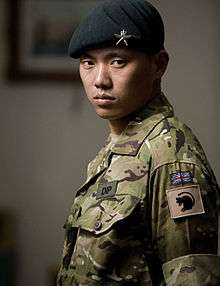Dipprasad Pun
| Dipprasad Pun | |
|---|---|
 Acting Sergeant Dipprasad Pun, 1st Battalion The Royal Gurkha Rifles [1] | |
| Born | Bima, Nepal |
| Allegiance | United Kingdom |
| Service/branch | British Army |
| Rank | Sergeant |
| Unit | 1st Battalion, The Royal Gurkha Rifles |
| Battles/wars | War in Afghanistan |
| Awards | Conspicuous Gallantry Cross |
| Relations | Tul Bahadur Pun (grandfather) |
Dipprasad Pun, CGC (Nepali: दिपप्रसाद पुन) is a Nepalese sergeant of the Royal Gurkha Rifles who was decorated with the Conspicuous Gallantry Cross for an act of bravery during the War in Afghanistan on the night of 17 September 2010.[2] Pun, then an acting sergeant, single-handedly defeated 30 Taliban insurgents who were storming his control post near Babaji in Helmand province.[3]
Pun is originally from Bima in western Nepal, and lives with his wife Shobha in Ashford.[3] His grandfather, Tul Bahadur Pun, was a recipient of the Victoria Cross during the Second World War, and his father and brother also served with the Gurkhas.
Conspicuous Gallantry Cross
Immediately prior to the engagement, Pun, who was with the 1st battalion Royal Gurkha Rifles, was on sentry duty at a checkpoint guarding his unit's compound. Taliban fighters, planting bombs near the compound gate under the cover of darkness, suddenly surrounded and attacked his post with AK-47s and RPGs. Acting Sergeant Pun, alone and believing he was about to die, decided to kill as many of the enemy as possible.[3] During the engagement he reportedly spent all his ammunition (more than 400 rounds), used 17 hand grenades and a Claymore mine before battering the last fighter with the tripod of his machine gun. Two Taliban were still attacking his post when he set off the Claymore mine.[3]
Upon receiving the award, Pun said that he had no choice but to fight; the reason being that the Taliban had surrounded his checkpoint, and that he was alone. During the engagement, Pun saved the lives of three of his comrades and prevented his post from being overrun. His actions are cited as "the bravest seen in his battalion during two hard tours".[4][5][6][7]
Citation
| “ | On the evening of the day in question [17 September 2010], Sergeant Pun was one of four men left in the southern compound because the platoon had pushed out a patrol to dominate the road to the east in readiness for the next day’s parliamentary elections. All were taking turns to man a single sangar position on the roof in the centre of the compound.
Sergeant Pun was on duty when he heard a clinking noise to the south of the checkpoint: “I thought at first maybe it was a cow," he said, "but my suspicions soon built up, and I saw Taliban digging to lay down an IED in front of our gate.” Sergeant Pun had the presence of mind to gather up two radios, which would enable him to both speak to his commander and to call in artillery support, his personal weapon, and a general purpose machine gun. Realising that he was about to be attacked, he quickly informed his commander on one of the radios, and launched a grenade at the enemy. Sergeant Pun single-handedly fought off an enemy attack on his lightly manned position. In the dark he tackled the enemy head on as he moved around his position to fend off the attack from three sides, killing three assailants and causing the others to flee. In doing so he saved the lives of his three comrades and prevented the position from being overrun. Sergeant Pun couldn’t know how many Taliban were attempting to overcome his position, but he sought them out from all angles despite the danger, consistently moving towards them to reach the best position of attack: “I thought there might have been around 20 to 30, but later locals told me it was probably about 15. The firing went on continually for about 17 minutes,” said Sergeant Pun. “At first I was a bit scared, and I thought definitely they are going to kill me. But as soon as I started firing, that feeling went away.” |
” | |
| — Ministry of Defence, [1] | |||
Footnotes
- 1 2 Ministry of Defence, UK; 21 March 2011. "The outstanding examples of a generation - the Op Honours recipients". Ministry of Defence, UK. Retrieved 29 April 2016.
- ↑ The London Gazette: (Supplement) no. 59737. p. 5640. 25 March 2011.
- 1 2 3 4 "Hero Gurkha handed bravery medal by Queen said: 'I thought I was going to die... so I tried to kill as many as I could' - Daily Mail Online". Mail Online. 2 June 2011. Retrieved 20 May 2016.
- ↑ (AFP) – 1 Jun 2011. "AFP: Queen decorates Nepali for Afghanistan heroics". Google.com. Retrieved 4 January 2012.
- ↑ "Gurkha gets UK´s 2nd highest medal for bravery - Detail News : Nepal News Portal". The Himalayan Times. Retrieved 2 June 2011.
- ↑ "BBC News - Bravery medal for Gurkha who fought Taliban". Bbc.co.uk. 25 March 2011. Retrieved 2 June 2011.
- ↑ "Brave Gurkha Diprasad Pun honoured". Kentonline.co.uk. Retrieved 2 June 2011.